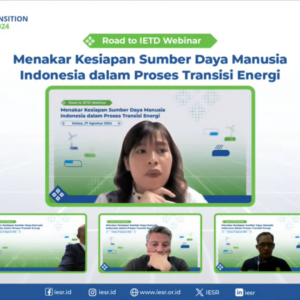Bali, August 26, 2024 – Southeast Asia (SEA) is forecasted to be the 4th biggest economic powerhouse in the world by 2050, with GDP to triple from 3.1 trillion in 2021 to 10.5 trillion in 2050 (ACE, 2022). With that ample economic growth, energy consumption is also realistically predicted to triple from 473.1 Mtoe by 2020 to 1,281.7 Mtoe by 2050 (ASEAN Energy Outlook 7th, 2023). The challenge is the region still heavily depends on fossil fuels for its energy demand, with oil (35%), coal (20%), and natural gas (20%) contributing to climate change and carbon dioxide worth 1,991 MtCo2eq in 2020 alone (ACE, 2023). This long-term energy policy practice has undeniably contradicted the global efforts to reduce 24-27 GtCo2e by 2030 and disarranged the 1.5 degrees Celsius target of the Paris Agreement (ASEAN, 2021). On the one hand, some potential lies as the region is calculated to have abundant renewable energy resources – reaching 17 TerraWatt (TW), and is possible to reach net zero with 90%-100% renewable energy by 2050 (IRENA and ACE, 2023). However, on the other hand, the region is reluctant to set the bar high for its renewable energy target because of the lack of political commitments and renewable energy investment, which is caused by the underdeveloped domestic policy, renewable energy legislation and reform, and supporting conditions for foreign investments in general (Vakulchuk, Overland, and Suryadi, 2022).
In that sense of urgency, Institute for Essential Services Reform (IESR) in collaboration with Climate Analytics, and Stanley Center for Peace and Security convened the Regional Dialogue: Decarbonizing the Power Sector in Southeast Asia in Bali, the 26th – the 27th of August 2024. This Regional Dialogue was convened to provide a place for high-level stakeholders and other relevant institutions in the SEA region to discuss the current challenges and opportunities for the region to phase out fossil fuel and increase renewable energy deployment and utilization. Further, the dialogue also provides the space to exchange ideas on regional cooperation in accelerating the clean energy transition in the region that will be reflected in the upcoming regional energy planning as well as tackling poverty, climate change, and supporting economic growth. Diverse and relevant attendees in the sectors participated in this event, including SEA utilities, government, think tanks, and diplomatic stakeholders.
Some critical points exposed in this event are that decarbonizing the energy sector will remain paramount in battling climate change as it contributes to 79% of GreenHouse Gas (GHG) emissions. There is, therefore, a massive urgency in decarbonizing specific relevant sectors such as power, transportation, and construction. This ambition is aligned with the COP29 mandate, which highlights the need to triple up renewable energy (RE) use and double down energy efficiency up to 11 TW by 2030, accelerate efforts towards the phase-down of unabated coal power and net zero emission energy system, and phase out inefficient fossil fuel subsidies that do not address energy poverty or just transition.
The Executive Director of IESR, Fabby Tumiwa mentioned that energy security will always be an important issue for Southeast Asia, and optimising the existing ASEAN Power Grid schemes can help optimise the use of higher-share of RE in the region. Other than the power grid, ASEAN also has another untapped potential, such as electrifying the transportation sectors through developing the EV ecosystem and down-streaming the critical mineral (nickel and tin) production to unlock the investment potential of solar PVs and battery manufacturing in the region.
“ASEAN already has the shared vision of successfully decarbonising the region. However, we collectively agree that decarbonising the power sectors will not be an easy journey. First, there are different ways of decarbonizing for different countries. Second, the decarbonisation of the power sectors needs much support, such as the right policy, regulations, incentives, financing, technology deployment, and political will. Finally, phasing out and shifting away from fossil fuel wholly, as remarked in COP 28, will become extremely challenging because coal has always opted as the cheapest energy source, and this has been rooted and translated into our ASEAN energy policies for decades,” said Fabby.
With that challenge persisting, Fabby reiterated that countries in the region can work together and strengthen the ecosystem in the region. Some important insights and best practices proposed in this regional dialogue should be communicated and translated to our policymakers and political leaders..
“Key actions must be followed up on, such as continuous dialogues and learning with the regional counterparts. Communications and engagements with our policymakers and political figures are also pivotal in securing their political will and structuring the necessary policies supporting decarbonisation. IESR will also actively monitor the progress of energy transition in SEA through the Southeast Asia Energy Transition Tracker (https://sea.energytransitions.id/) by adding more energy transition reports from Singapore, Malaysia, Thailand, Cambodia, and Laos. IESR is therefore seeking support and collaborations to expand this monitoring page by inviting collaborators for the website. By increasing the transparency of RE progress in the region, the Southeast Asia Energy Transition Tracker will become a solid comparative and better benchmarking tool for the Government of Indonesia,” said Fabby.


